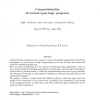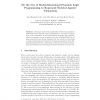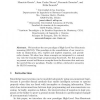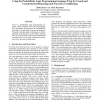1137 search results - page 3 / 228 » Knowledge Representation with Logic Programs |
114
click to vote
SLP
1997
15 years 3 months ago
1997
Compositionality of programsis an important concern in knowledge representation and software development. In the context of Logic Programming, up till now, the issue has mostly be...
145
click to vote
EPIA
2001
Springer
15 years 7 months ago
2001
Springer
This paper explores the applicability of the new paradigm of Multi-dimensional Dynamic Logic Programming to represent an agent’s view of the combination of societal knowledge dyn...
120
click to vote
MICAI
2000
Springer
15 years 6 months ago
2000
Springer
We introduce the new paradigm of High-Level Non-Monotonic reasoning (HLNM). This paradigm is the consolidation of our recent results on disjunctions, sets, explicit and implicit ne...
114
click to vote
ICLP
2007
Springer
15 years 8 months ago
2007
Springer
Abstract. The system presented in this paper aims at using Contextual Logic Programming as a computational hub for knowledge modeled by web ontologies and enable querying that repr...
135
click to vote
IJCAI
2007
15 years 3 months ago
2007
P-log is a probabilistic logic programming language, which combines both logic programming style knowledge representation and probabilistic reasoning. In earlier papers various ad...




